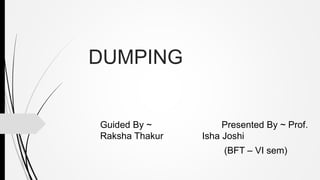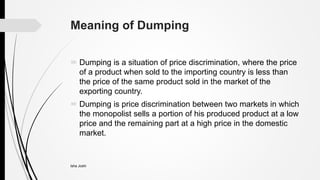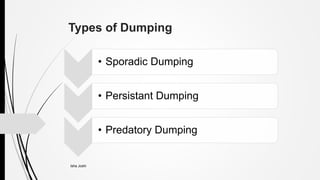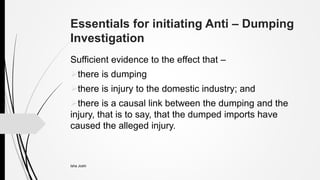- 1. DUMPING
Guided By ~ Presented By ~ Prof.
Raksha Thakur Isha Joshi
(BFT – VI sem)
- 2. Meaning of Dumping
Dumping is a situation of price discrimination, where the price
of a product when sold to the importing country is less than
the price of the same product sold in the market of the
exporting country.
Dumping is price discrimination between two markets in which
the monopolist sells a portion of his produced product at a low
price and the remaining part at a high price in the domestic
market.
Isha Joshi
- 3. Why does Dumping take place?
Price discrimination: The first reason of dumping is price discrimination. If
a firm has monopoly of a good in home market, but faces strong competition
in foreign market, the firm will naturally charge a higher price in home market
and lower competitive price in foreign market.
Predatory pricing: The second major reason is predatory pricing. It is the
practice of cutting prices of goods in an attempt to drive rival firms out of
business.
Surplus stock: A firm may resort to dumping to dispose off surplus stock.
Isha Joshi
- 4. Objectives of Dumping
1)To find a place in the foreign market
2)To sell surplus commodity
3)Expansion of industry
4)New trade relations
Isha Joshi
- 5. Types of Dumping
Isha Joshi
• Sporadic Dumping
• Persistant Dumping
• Predatory Dumping
- 6. Effects of Dumping
Isha Joshi
On Importing Country
On Exporting Country
- 7. Effects on Importing Country
If a producer dumps his commodity abroad for a short period, then the
industry of the importing country is affected for a short while. Due to the low
price of the dumped commodity, the industry of that country has to incur a
loss for some time because less quantity of its commodity is sold.
Dumping is harmful for the importing country if it continues for a long
period. This is because it takes time for changing production in the importing
country and its domestic industry is not able to bear competition. But when
cheap imports stop or dumping does not exist, it becomes difficult to
change the production again.
Isha Joshi
- 8. If the dumped commodity is a consumer good, the demand of the
people in the importing country will change for the cheap goods. When
dumping stops, this demand will reverse, thereby changing the tastes of
the people which will be harmful for the economy.
If the monopolist dumps the commodity for removing his competitors
from the foreign market, the importing country gets the benefit of cheap
commodity in the beginning. But after competition ends and he sells the
same commodity at a high monopoly price, the importing country incurs a
loss because now it has to pay a high price.
Isha Joshi
- 9. Effects on Exporting Country
When domestic consumers have to buy the monopolistic commodity at a high price
through dumping, there is loss in their consumers’ surplus. But if a monopolist
produces more commodities in order to dump it in another country, consumers benefit.
This is because with more production of the commodity, the marginal cost falls. As a
result, the price of the commodity will be less than the monopoly price without
dumping.
The exporting country also benefits from dumping when the monopolist produces
more commodity. Consequently, the demand for the required inputs such as raw
materials, etc. for the production of that commodity increases, thereby expanding the
means of employment in the country.
Isha Joshi
- 10. The exporting country earns foreign currency by
selling its commodity in large quantity in the foreign
market through dumping. As a result, its balance of
trade improves.
Isha Joshi
- 11. Management of Dumping
Isha Joshi
Price Undertaking
Anti - Dumping
- 12. Price Undertaking
Undertaking by an exporter to raise the export
price of the product to avoid the possibility of an
anti-dumping duty.
Isha Joshi
- 13. Anti - Dumping
It is a measure to rectify the situation arising out of the dumping of goods
and its trade distortive effect.
Re-establish fair trade.
The use of anti dumping measure as an instrument of fair competition is
permitted by the WTO.
It provides relief to the domestic industry against the injury caused by
dumping.
Isha Joshi
- 14. Imposition of Anti – Dumping Duty
If there is dumping but no injury then no duty can be imposed.
Duty remains in force for 5 years.
Re-determination at a “sunset review”.
Yearly administrative reviews if requested by domestic industry or exporter.
Isha Joshi
- 15. Essentials for initiating Anti – Dumping
Investigation
Sufficient evidence to the effect that –
there is dumping
there is injury to the domestic industry; and
there is a causal link between the dumping and the
injury, that is to say, that the dumped imports have
caused the alleged injury.
Isha Joshi
- 16. Period of Investigation
Should not be less than six months and not more than eighteen months.
The most desirable period of investigation is a financial year. (period
should be as representative as possible)
For the purposes of injury analysis, the domestic industry has to furnish the
relevant data for the past three years.
Isha Joshi
- 17. Stages of the Investigation Process
Preliminary Screening
Initiation
Access to Information
Preliminary Findings
Provisional Duty
Disclosure of Information
Final Findings
Isha Joshi
- 18. Preliminary Screening
The application is scrutinized to ensure that it is fully
documented
provides sufficient evidence for initiating an investigation.
If evidence not adequate, then a deficiency letter is issued.
Till then cannot be considered as application pending before
authority.
Isha Joshi
- 19. Initiation
Designated Authority determines that the application has been
made by or on behalf of the Domestic Industry.
It also examines the accuracy and adequacy of the evidence
provided
The Initiation notice will be issued normally within 5 days from
the date of receipt of a properly documented application.
Isha Joshi
- 20. Access to Information
The Authority provides access to the non-confidential
evidence available for inspection to all interested
parties on request after receipt of the responses.
Isha Joshi
- 21. Preliminary Findings
The Designated Authority will proceed expeditiously
with the conduct of the investigation
It makes a preliminary finding containing the detailed
information on the main reasons behind the
determination.
Isha Joshi
- 22. Provisional Duty
A provisional duty not exceeding the margin of dumping may
be imposed by the Central Government on the basis of the
preliminary finding
Can be imposed only after the expiry of 60 days from the date
of initiation of investigation.
The provisional duty will remain in force only for a period not
exceeding 6 months, extendable to 9 months under certain
circumstances.
Isha Joshi
- 23. Disclosure of Information
Based on these submissions and evidence gathered
the Authority will determine the basis of its final
findings.
The Designated Authority will inform all interested
parties of the essential facts, which form the basis for
its decision before the final finding is made.
Isha Joshi
- 24. Final Findings
The interested parties submit their response to the
disclosure and
The Authority examines these final submissions of
the parties and comes out with final findings.
Isha Joshi
- 25. Isha Joshi

























